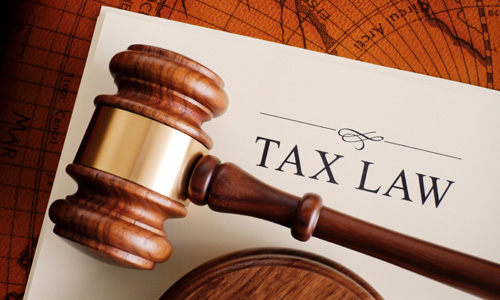
Tax Law Blog
 This is the third in a series of articles written for MICPA members examining the far-reaching impact of the Supreme Court’s decision in South Dakota v. Wayfair, Inc.
This is the third in a series of articles written for MICPA members examining the far-reaching impact of the Supreme Court’s decision in South Dakota v. Wayfair, Inc.
 This is the second in a series of articles written for MICPA members examining the far-reaching impact of the Supreme Court’s decision in South Dakota v. Wayfair, Inc.
This is the second in a series of articles written for MICPA members examining the far-reaching impact of the Supreme Court’s decision in South Dakota v. Wayfair, Inc.
 Some businesses are (unpleasantly) surprised when they learn they are responsible for taxes -such as sales and income taxes - in states in which they have no physical presence. What gives rise to liability in these situations is “economic nexus,” which relates to a business’ activity, such as the generation of sales without a physical presence, in a state. Nexus, therefore, can be a hidden trap for businesses with multistate sales and other activities, particularly because what gives rise to nexus is often uncertain and unexplained by a state’s taxing authority.
Some businesses are (unpleasantly) surprised when they learn they are responsible for taxes -such as sales and income taxes - in states in which they have no physical presence. What gives rise to liability in these situations is “economic nexus,” which relates to a business’ activity, such as the generation of sales without a physical presence, in a state. Nexus, therefore, can be a hidden trap for businesses with multistate sales and other activities, particularly because what gives rise to nexus is often uncertain and unexplained by a state’s taxing authority.
Michigan Department of Treasury (the “Treasury”) has shed light on what constitutes nexus in Michigan through the issuance of a release that explains the nexus standards for Michigan business taxes. The release (the “Release”) addresses the sales and use tax presumption for out-of-state sellers; the nexus standards for the corporate income tax; and the nexus standards for flow-through entity withholding.
Sales and Use taxes are basically a 6 percent tax on the sale, use and consumption or storage of tangible personal property in the state of Michigan. Michigan has ramped up its enforcement of these two taxes. In short, Michigan is getting less revenue from its traditional tax basis so the state is really looking to enforce compliance with the sales and use tax more than what they used to. What does that mean for you? It means that you might get audited. Learn more about what you should do if you get audited in the video below.
 The Michigan Department of Treasury has published its Other Deductions Manual (the “Manual”). The Manual provides a listing and analysis of the common sales and use tax exemptions.
The Michigan Department of Treasury has published its Other Deductions Manual (the “Manual”). The Manual provides a listing and analysis of the common sales and use tax exemptions.
If you are a business subject to Michigan sales or use tax, then the Manual is a helpful resource to have on file.
The Manual can be downloaded by clicking this link.
 Under a new law effective October 1, 2015, an out-of-state seller may be required to remit sales or use tax on sales into Michigan if the seller has nexus under amendments to the Michigan General Sales Tax Act (MCL 205.52b) and Michigan Use Tax Act (MCL 205.95a). The new law creates a presumption that a seller is engaged in the business of making sales at retail in Michigan if the seller, or another person on the seller’s behalf, engages in certain activities in Michigan. In addition, a seller will be presumed to be making sales in Michigan if the seller enters into an agreement with one or more Michigan residents under which the resident, for a commission or other consideration, refers potential purchasers to the seller, such as by a link on a website). This is sometimes referred to as “click-through” nexus. If you are a seller that sells into Michigan on or after October 1, 2015, and you are not already registered with the Department of Treasury and remitting sales or use tax, you may need to register for Michigan sales and use tax. For information regarding Michigan’s tax registration and remittance requirements, please contact a member of Foster Swift's State and Local Tax group.
Under a new law effective October 1, 2015, an out-of-state seller may be required to remit sales or use tax on sales into Michigan if the seller has nexus under amendments to the Michigan General Sales Tax Act (MCL 205.52b) and Michigan Use Tax Act (MCL 205.95a). The new law creates a presumption that a seller is engaged in the business of making sales at retail in Michigan if the seller, or another person on the seller’s behalf, engages in certain activities in Michigan. In addition, a seller will be presumed to be making sales in Michigan if the seller enters into an agreement with one or more Michigan residents under which the resident, for a commission or other consideration, refers potential purchasers to the seller, such as by a link on a website). This is sometimes referred to as “click-through” nexus. If you are a seller that sells into Michigan on or after October 1, 2015, and you are not already registered with the Department of Treasury and remitting sales or use tax, you may need to register for Michigan sales and use tax. For information regarding Michigan’s tax registration and remittance requirements, please contact a member of Foster Swift's State and Local Tax group.
 On July 22, the Michigan Supreme Court decided Detroit Edison Company v. Department of Treasury, holding that the Michigan Use Tax apportionment rules apply in situations where property is simultaneously used for exempt and non-exempt purposes. The claim was initiated by Detroit Edison Company ("DTE") in response to a use tax audit by the Department of Treasury. The audit determined that DTE wrongly claimed an exemption from use tax for property used outside of its plant (transformers, fuses, circuit breakers, etc.), resulting in a deficiency assessment of over $13 million plus interest.
On July 22, the Michigan Supreme Court decided Detroit Edison Company v. Department of Treasury, holding that the Michigan Use Tax apportionment rules apply in situations where property is simultaneously used for exempt and non-exempt purposes. The claim was initiated by Detroit Edison Company ("DTE") in response to a use tax audit by the Department of Treasury. The audit determined that DTE wrongly claimed an exemption from use tax for property used outside of its plant (transformers, fuses, circuit breakers, etc.), resulting in a deficiency assessment of over $13 million plus interest.
 Online shopping continues to increase in popularity. But it's not just the convenience of having a package arrive at one's doorstep without having to trudge to the mall that many shoppers prefer. Some online retailers do not collect sales tax on purchases, meaning that online shoppers in Michigan have historically been able to avoid paying Michigan's 6 percent sales tax - which Michigan bricks and mortar retailers are required to collect at the time of purchase. That's not to say that online purchases are tax free, as Michigan residents are obligated to report online purchases on their tax returns and pay 6 percent use tax. But most taxpayers ignore - or are not even aware of - this obligation.
Online shopping continues to increase in popularity. But it's not just the convenience of having a package arrive at one's doorstep without having to trudge to the mall that many shoppers prefer. Some online retailers do not collect sales tax on purchases, meaning that online shoppers in Michigan have historically been able to avoid paying Michigan's 6 percent sales tax - which Michigan bricks and mortar retailers are required to collect at the time of purchase. That's not to say that online purchases are tax free, as Michigan residents are obligated to report online purchases on their tax returns and pay 6 percent use tax. But most taxpayers ignore - or are not even aware of - this obligation.
Michigan retailers have long lamented what they perceive as an un-level playing field in their battle with online retailers, and the state government estimates that hundreds of millions of dollars in tax revenue is not collected every year on online purchases. If a recently passed law has its intended effect, sales tax collections on online purchases should experience a surge.
 Every year, the Michigan Department of Treasury audits Michigan businesses for compliance with the Sales and Use tax laws. Oftentimes, those audits result in tax assessments that are disputed by the taxpayer. But, how does a taxpayer navigate the audit process and challenge a tax assessment?
Every year, the Michigan Department of Treasury audits Michigan businesses for compliance with the Sales and Use tax laws. Oftentimes, those audits result in tax assessments that are disputed by the taxpayer. But, how does a taxpayer navigate the audit process and challenge a tax assessment?
There have been several recent tax changes to Michigan tax law. New exemptions may be valuable to you. Consult a tax professional for advice as to how to make the most of available tax benefits.
Sales Tax Exemption for Vehicle Trade-Ins
Starting Dec. 15, 2013, up to $2,000 of the value of a motor vehicle or recreational vehicle traded-in to pay for a new or used motor or recreational vehicle may be exempt from sales tax. The agreed-upon value must be separately stated. Starting Jan. 1, 2015, the exemption limit is increased by an additional $500 per year.
Use Tax Exemption for Vehicle Trade-Ins
Also starting Dec. 15, 2013, up to $2,000 of the value of a motor vehicle or recreational vehicle traded-in to pay for a new or used motor or recreational vehicle may be exempt from use tax.
 On May 23rd, the Michigan Court of Appeals upheld a tax tribunal decision that held a restaurant owner personally liable for unpaid taxes, even though that owner had minimal involvement in the preparation of those taxes. Griffin, Jr. v. Dep't of Treasury. The restaurant had failed to pay its sales and withholding tax liabilities for four months, resulting in bills for the unpaid taxes, penalties, and interest on the overdue amount. Based on MCL 205.27a, the Department of Treasury sought to hold the restaurant owner personally liable for the tax bill.
On May 23rd, the Michigan Court of Appeals upheld a tax tribunal decision that held a restaurant owner personally liable for unpaid taxes, even though that owner had minimal involvement in the preparation of those taxes. Griffin, Jr. v. Dep't of Treasury. The restaurant had failed to pay its sales and withholding tax liabilities for four months, resulting in bills for the unpaid taxes, penalties, and interest on the overdue amount. Based on MCL 205.27a, the Department of Treasury sought to hold the restaurant owner personally liable for the tax bill.
Foster Swift successfully reverses a $500,000 use tax assessment in Arrow Energy Services, Inc. v. Department of Treasury (MTT No: 404349).
Facts of Case
In 2008, the Department of Treasury audited Arrow Energy for use tax compliance. Arrow Energy is an oil and gas servicing company. During the period of the audit, Arrow Energy was primarily engaged in turnkey operations whereby Arrow Energy utilized subcontractors to construct production-ready natural gas wells for third parties.
The Michigan Use Tax Act has several notable exemptions, one of which is the agricultural exemption. The agricultural use tax exemption covers “[p]roperty sold to a person engaged in a business enterprise and using and consuming the property . . . in the breeding, raising, or caring for livestock, poultry, or horticultural products.” MCL § 205.94(1)(f). This establishes two requirements for the use tax exemption:
 If your business is currently undergoing a use tax audit, then take notice.
If your business is currently undergoing a use tax audit, then take notice.
The statute of limitations for use tax audits is set forth in the Revenue Act. Specifically, MCL 205.27a states that:
 Every year, the Michigan Department of Treasury audits Michigan businesses for compliance with the Sales and Use tax laws. Oftentimes, those audits result in tax assessments that are disputed by the taxpayer. But, how does a taxpayer navigate the audit process and challenge a tax assessment?
Every year, the Michigan Department of Treasury audits Michigan businesses for compliance with the Sales and Use tax laws. Oftentimes, those audits result in tax assessments that are disputed by the taxpayer. But, how does a taxpayer navigate the audit process and challenge a tax assessment?
Let’s take a look at the basics.
 Suppose you visit your local electronics store and purchase a new TV. You pay for the TV, but notice that the retailer did not charge sales tax. Are you now liable for use tax?
Suppose you visit your local electronics store and purchase a new TV. You pay for the TV, but notice that the retailer did not charge sales tax. Are you now liable for use tax?
The answer is “no” according to a recent Court of Appeals ruling. Andrie, Inc. v. Department of Treasury. But, let’s look at the details.
 Most business owners are familiar with the concept of "piercing the corporate veil" – that legal theory whereby owners and officers may be personally liable for the obligations of a corporation. However, personal liability may also be imposed in the sales and use tax arena.
Most business owners are familiar with the concept of "piercing the corporate veil" – that legal theory whereby owners and officers may be personally liable for the obligations of a corporation. However, personal liability may also be imposed in the sales and use tax arena.
